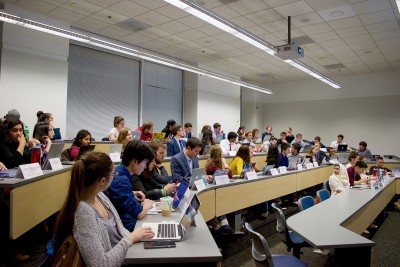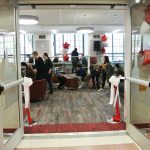
The Boston University Student Government Senate gathered Monday evening for the last meeting of the 2015-16 academic year, passing four amendments and rejecting two throughout the nearly four-hour meeting.
Adrianna Ortega, a South Campus Residence Hall Association senator and a junior in the School of Education, motioned at the beginning of the meeting to revote on SG President-elect Jake Brewer’s amendment that was not passed at Senate’s previous meeting.
The amendment aimed to add a Lower House to the existing structure of Senate to increase direct student representation and involvement, The Daily Free Press reported April 21.
After approximately one hour of debate, the amendment once again failed to pass, as it did not meet the necessary two-thirds approval from Senate. Approximately 58 of percent senators voted for the amendment, 33 percent voted against and 8 percent abstained.
Brewer, a junior in the College of Arts and Sciences, presented an amendment to the Senate bylaws nearing the end of the meeting. The amendment proposed to create a process for referendum proposals. The original amendment would have created three types of referendum proposals — a proposal voted by a simple majority of senators, a proposal backed up by a petition signed by 10 percent of undergraduate students or a proposal voted by a simple majority of members of the Executive Board and department heads.
The senators took out the third type of proposal, as they argued that it contradicts the checks-and-balances concept. The remaining bylaws were passed with 89 percent of senators voting yes, 9 percent against and 3 percent abstaining.
Daniel Collins, the vice senate chair, proposed a bylaws amendment that would require a runoff election for any E-board election in which no candidate receives a majority of the votes. The proposal passed with 85 percent senators in support of the amendment, while 15 percent abstained.
“I hope the recall election is not something that ever has to be used,” Collins, a sophomore in CAS, said following the meeting.
Collins proposed another amendment that would create a specific set of guidelines for an impeachment process. The amendment passed with 91 percent senators voting yes, 3 percent voting no and 6 percent abstaining.
“I am glad that should a situation arise like it did in November, we have legitimate guidelines that can be referred to,” Collins said following the meeting, referring to the November 2015 impeachment of two E-board members.
Aside from the amendments, senators voted to create two committees, the Academic Climate Standing Committee and the Mental Health Standing Committee, to address pressing issues in and outside of the classroom.
Senators also unanimously voted to confirm three committee chair members for 16,000 Strong, with William Horne remaining as chair, and Kaitlyn Perreault and Joshua Mosby as co-chairs for the Expect More Committee.
Vice President of Internal Affairs Yasmin Gentry and Vice President of Finance Akiko Endo requested $3,912 from Senate to continue the Gender Advocacy and Progress Week initiative in the following school year. Senate fulfilled the request and allocated all of its remaining SG funds of $5,026.65.
Nehemiah Dureus, a College of Engineering senator, motioned that the remaining funds be spent on providing free feminine hygiene products. The motion passed with 94 percent of senators voting yes, while 6 percent abstained.
Senate Chair Courtney Bold said after the meeting that she appreciated the senators’ increased commitment throughout the year.
“We’ve seen a new height of engagement from senators this semester, and I’m really proud of everything they’ve accomplished,” said Bold, a senior in the Questrom School of Business. “It was a pleasure serving as Senate chair.”
SG President Andrew Cho said after the meeting that his experience in SG was fulfilling.
“I’ve learned a lot,” said Cho, a senior in CAS. “I’m grateful for a lot of senators taking initiative in ways that I haven’t seen Senate do before. The scope of SG definitely has changed, which is really cool to see.”
After the meeting, several senators said they had mixed feelings regarding the amendments that were passed and rejected.
Claire Tran, a Warren Towers RHA senator, said she was happy to have passed some amendments during the meeting, but some of the amendments that she supported were not passed.
“I’m glad we got some things done,” said Tran, a freshman in the College of Communication. “Now there are at least some new ways for students to be more active on campus.”
Anushka Pinto, a CAS senator, said though she was disappointed by the result of the re-vote, she was pleased that Senate passed the referendum amendment.
“It was pretty disappointing, especially because we had reached a compromise, and again [the amendment] wasn’t passed, which was actually pretty surprising,” said Pinto, a junior in CAS. “I thought the lack of senators last time would have made up for this time, [but] the referendum amendment was a win for Senate and a win for the E-board.”




